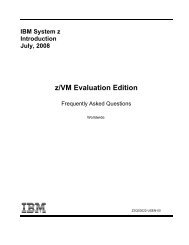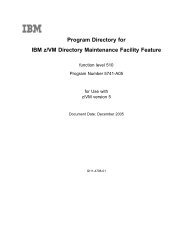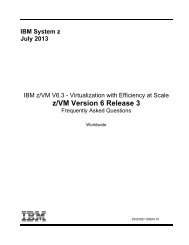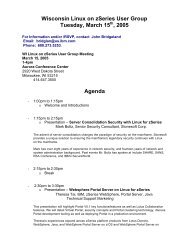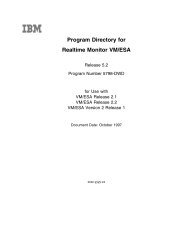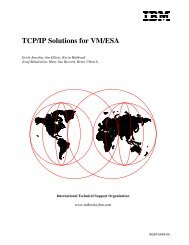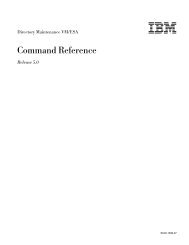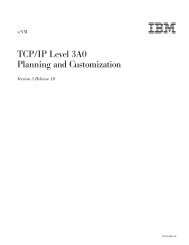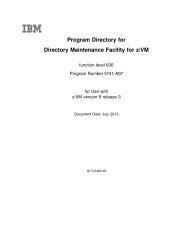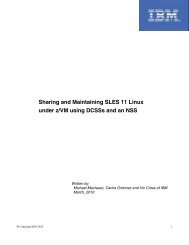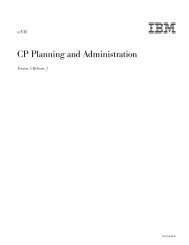- Page 1: z/VMTCP/IP Level 3A0Programmer’s
- Page 4 and 5: Note!Before using this information
- Page 6 and 7: write() . . . . . . . . . . . . . .
- Page 8 and 9: svcerr_systemerr() . . . . . . . .
- Page 11 and 12: Preface||TCP/IP for VM: Programmer
- Page 14 and 15: Syntax Diagram DescriptionAbbreviat
- Page 16 and 17: How Numbers Are Used in This BookIn
- Page 18 and 19: xviz/VM: TCP/IP Programmer’s Refe
- Page 20 and 21: General Programming Information3. S
- Page 22 and 23: General Programming Informationv my
- Page 24 and 25: C Sockets Application Program Inter
- Page 26 and 27: C Sockets Application Program Inter
- Page 29 and 30: C Sockets Application Program Inter
- Page 31 and 32: C Sockets Application Program Inter
- Page 33 and 34: C Sockets Application Program Inter
- Page 35: C Sockets Application Program Inter
- Page 39 and 40: Table 2. C Socket Reference (contin
- Page 41 and 42: accept()requesters it accepts conne
- Page 43 and 44: interfaces (which match the bound n
- Page 45 and 46: .rc = bind(s, (struct sockaddr *) &
- Page 47 and 48: connect()};short sin_family;unsigne
- Page 49 and 50: endnetent()The endhostent() call is
- Page 51 and 52: getclientid()clientidPoints to a cl
- Page 53 and 54: Note: The HOSTS ADDRINFO file is cr
- Page 55 and 56: getibmsockopt()#include #include in
- Page 57 and 58: getnetbyaddr()n_addrtypen_netIndica
- Page 59 and 60: the call returns. The size of the p
- Page 61 and 62: See Also: endprotoent(), getprotoby
- Page 63 and 64: getsockname()#include #include int
- Page 65 and 66: ||||||||||||||||||||||OptionIP_MULT
- Page 67 and 68: getsockopt()./* Is out of band data
- Page 69 and 70: htonl()htonl()#include unsigned lon
- Page 71 and 72: inet_lnaof()ParameterinDescriptionS
- Page 73 and 74: ioctl()cmddataSpecifies the command
- Page 75 and 76: as an active socket to initiate con
- Page 77 and 78: ntohl()#include unsigned long ntohl
- Page 79 and 80: eadv()EFAULTEINVALEWOULDBLOCKUsing
- Page 81 and 82: call waits for a message to arrive
- Page 83 and 84: select()Description: The select() c
- Page 85 and 86: select()int rc, max_sock;/* initial
- Page 87 and 88:
Description: The send() call sends
- Page 89 and 90:
sendto()#include #include int sendt
- Page 91 and 92:
setibmsockopt()For outbound datagra
- Page 93 and 94:
setnetent()Related Calls:getibmsock
- Page 95 and 96:
setsockopt()|||||||||||||||||||||||
- Page 97 and 98:
setsockopt()|||||||||||||||EADDRINU
- Page 99 and 100:
sock_do_bulkmode()#include #include
- Page 101 and 102:
socket()SOCK_RAWmessages of a fixed
- Page 103 and 104:
socket()EPROTONOSUPPORTIndicates th
- Page 105 and 106:
tcperror()Example 2if ((s=socket(AF
- Page 107 and 108:
Sample C Socket ProgramsSample C So
- Page 109 and 110:
* Server Main.*/main(argc, argv)int
- Page 111 and 112:
server.sin_addr.s_addr = INADDR_ANY
- Page 113 and 114:
Chapter 3. TCP/UDP/IP API (Pascal L
- Page 115 and 116:
Pascal LanguageSENDINGonlyIndicates
- Page 117 and 118:
Pascal LanguageNotificationInfoType
- Page 119 and 120:
Pascal LanguageCONNECTIONstateCHANG
- Page 121 and 122:
Pascal LanguageIOinterruptNotificat
- Page 123 and 124:
UrgentSpanIndicates the number of u
- Page 125 and 126:
Handling External InterruptsThe han
- Page 127 and 128:
Pascal LanguageTable 12. Pascal Lan
- Page 129 and 130:
BeginTcpIpvvvvfatalerrorNOtcpIPserv
- Page 131 and 132:
GetHostStringThe GetHostString proc
- Page 133 and 134:
Handleprocedure Handle(Notification
- Page 135 and 136:
MonCommandvvUNAUTHORIZEDuserUNIMPLE
- Page 137 and 138:
PingRequestThe PingRequest procedur
- Page 139 and 140:
RawIpReceiveprocedure RawIpReceive(
- Page 141 and 142:
ReadXlateTableAtoETableEtoATableTra
- Page 143 and 144:
SayIntNumThe SayIntNum function con
- Page 145 and 146:
StartTcpNoticeClientDoesVmcfReturnC
- Page 147 and 148:
immediately. A return code of OK me
- Page 149 and 150:
TcpFReceive, TcpReceive, and TcpWai
- Page 151 and 152:
TcpFSend, TcpSend, and TcpWaitSendB
- Page 153 and 154:
TcpOpen and TcpWaitOpenReturnCodeOp
- Page 155 and 156:
TcpOptionReturnCodeIndicates the su
- Page 157 and 158:
UdpNReceiveThe UdpNReceive procedur
- Page 159 and 160:
UdpReceiveReturnCodeIndicates the s
- Page 161 and 162:
Sample Pascal Program{*************
- Page 163 and 164:
Sample Pascal ProgramLocalSocket.Po
- Page 165 and 166:
Chapter 4. Virtual Machine Communic
- Page 167 and 168:
transaction initiated by your virtu
- Page 169 and 170:
Table 17. VMCF TCPIP CALLCODE Reque
- Page 171 and 172:
FUNC: SENDVADA: 0LENA: 1VADB: 0 or,
- Page 173 and 174:
If the open attempt cannot be initi
- Page 175 and 176:
VMCF InterfaceRETCODEOKIf TCPIP res
- Page 177 and 178:
OPENudpThe OPENudp call opens a UDP
- Page 179 and 180:
If TCPIP immediately determines tha
- Page 181 and 182:
VMCF InterfaceQueryType DS X* For Q
- Page 183 and 184:
FUNC:JOBNAME:LENA:VADB:LENB:SENDNam
- Page 185 and 186:
RAWIPspaceAVAILABLEThis interrupt h
- Page 187 and 188:
Chapter 5. Inter-User Communication
- Page 189 and 190:
If an IUCV operation completes with
- Page 191 and 192:
Note: A single virtual machine can
- Page 193 and 194:
vvIUCV SocketsMultiple ACCEPT calls
- Page 195 and 196:
IUCV SocketsTable 20. C Structures
- Page 197 and 198:
CANCELKeyword ValueTRGCLS High-orde
- Page 199 and 200:
FCNTLKeyword ValueTRGCLS High-order
- Page 201 and 202:
GETHOSTNAMEANSLEN namelen +8ANSBUF
- Page 203 and 204:
Low-order fullword = optname. Possi
- Page 205 and 206:
IOCTLKeyword ValueTRGCLS High-order
- Page 207 and 208:
Low-order halfword = sDATA PRMMSGPR
- Page 209 and 210:
RECV, RECVFROM, RECVMSGOffset Name
- Page 211 and 212:
SELECT, SELECTEXOffset Name Length
- Page 213 and 214:
SENDTOcc = sendto(s, msg, len, flag
- Page 215 and 216:
SHUTDOWNLow-order halfword = sDATA
- Page 217 and 218:
TAKESOCKETANSLEN 8ANSBUF The pointe
- Page 219 and 220:
Chapter 6. Remote Procedure CallsTh
- Page 221 and 222:
RPCs──────────
- Page 223 and 224:
RPCsFor additional information abou
- Page 225 and 226:
Printing System Return MessagesTo p
- Page 227 and 228:
callrpc()Description: The authunix_
- Page 229 and 230:
clnt_call()clnt_call()#include enum
- Page 231 and 232:
clnt_destroy()clnt_destroy()#includ
- Page 233 and 234:
clnt_perror()#include voidclnt_perr
- Page 235 and 236:
machine, which simulates RPC progra
- Page 237 and 238:
getrpcport()getrpcport()#include u_
- Page 239 and 240:
pmap_rmtcall()outtoutportpPoints to
- Page 241 and 242:
svc_destroy()#include voidsvc_destr
- Page 243 and 244:
svc_register()#include protocoldisp
- Page 245 and 246:
svcerr_noproc()#include voidsvcerr_
- Page 247 and 248:
svctcp_create()#include SVCXPRT *sv
- Page 249 and 250:
xdr_authunix_parms()#include bool_t
- Page 251 and 252:
xdr_double()#include bool_txdr_doub
- Page 253 and 254:
xdr_int()Note: xdr_inline() can ret
- Page 255 and 256:
See Also: callrpc(), clnt_broadcast
- Page 257 and 258:
xdr_short()Return Values: The value
- Page 259 and 260:
xdr_union()xdr_union()#include bool
- Page 261 and 262:
xdrmem_create()xdrmem_create()#incl
- Page 263 and 264:
xdrstdio_create()#include #include
- Page 265 and 266:
RPC Server#include #include #define
- Page 267 and 268:
RPC Raw Data Stream* data structure
- Page 269 and 270:
Chapter 7. X Window System Interfac
- Page 271 and 272:
Application Resource FileWhen progr
- Page 273 and 274:
X Window System InterfaceThe option
- Page 275 and 276:
Manipulating WindowsTable 26 provid
- Page 277 and 278:
X Window System InterfaceTable 31.
- Page 279 and 280:
Clearing and Copying AreasTable 36
- Page 281 and 282:
X Window System InterfaceTable 40.
- Page 283 and 284:
Table 45. Manipulating Keyboard Set
- Page 285 and 286:
Using Default Error HandlingTable 5
- Page 287 and 288:
X Window System InterfaceTable 52.
- Page 289 and 290:
Manipulating ImagesTable 56 provide
- Page 291 and 292:
X Window System InterfaceTable 59.
- Page 293 and 294:
Extension RoutinesTable 60 lists th
- Page 295 and 296:
X Window System InterfaceMiscellane
- Page 297 and 298:
Table 63. Miscellaneous Utility Rou
- Page 299 and 300:
X Window System InterfaceTable 65.
- Page 301 and 302:
X Window System InterfaceTable 65.
- Page 303 and 304:
X Window System InterfaceTable 65.
- Page 305 and 306:
X Window System InterfaceTable 65.
- Page 307 and 308:
X Window System InterfaceTable 65.
- Page 309 and 310:
Table 66. Athena Widget Routines (c
- Page 311 and 312:
MIT Extensions to XX Window System
- Page 313 and 314:
X Window System InterfaceTable 67.
- Page 315 and 316:
X Window System Interfacewill have
- Page 317 and 318:
X Window System InterfaceTable 69.
- Page 319 and 320:
Athena Widget Sample Program* repre
- Page 321 and 322:
Chapter 8. Kerberos Authentication
- Page 323 and 324:
Ticket-Granting ServerKerberos Auth
- Page 325 and 326:
┌──────────
- Page 327 and 328:
ApplicationsApplicationsYou are res
- Page 329 and 330:
Description: The krb_mk_priv() rout
- Page 331 and 332:
Return Values: krb_rd_err() places
- Page 333 and 334:
krb_rd_req()vvvRD_AP_TIMERD_AP_NYVR
- Page 335 and 336:
krb_sendauth()int krb_sendauth(opti
- Page 337 and 338:
Kerberos Client#include #include #i
- Page 339 and 340:
* please see the file .** sample_se
- Page 341 and 342:
* write back the response */if ((co
- Page 343 and 344:
Chapter 9. SNMP Agent Distributed P
- Page 345 and 346:
Processing a GET RequestThe DPI pac
- Page 347 and 348:
SNMP DPI ReferenceTCPLOAD load_list
- Page 349 and 350:
As a result, the structure dpi_set_
- Page 351 and 352:
mkDPItrap()The value of type can be
- Page 353 and 354:
You can use a mkDPIset() call to cr
- Page 355 and 356:
query_DPI_port()#include int query_
- Page 357 and 358:
-ent_traps Generates nine enterpris
- Page 359 and 360:
Client Sample Program#include #incl
- Page 361 and 362:
static short int dpi_port; /* DPI_p
- Page 363 and 364:
Client Sample Programclose(dpi_fd);
- Page 365 and 366:
Client Sample Programdata = mkDPIse
- Page 367 and 368:
else if (strcmp("ent_traps",command
- Page 369 and 370:
if (data == 0) {printf("Could not m
- Page 371 and 372:
#endifif (rc != PACKET_LEN(packet))
- Page 373 and 374:
Client Sample Program}break;case 9
- Page 375 and 376:
Client Sample Program#endif /* _NO_
- Page 377 and 378:
Chapter 10. SMTP Virtual Machine In
- Page 379 and 380:
EHLOSMTP Virtual Machine Interfaces
- Page 381 and 382:
SMTP Virtual Machine InterfacesPara
- Page 383 and 384:
SMTP Virtual Machine Interfaces►
- Page 385 and 386:
SMTP Virtual Machine InterfacesNote
- Page 387 and 388:
SMTP Virtual Machine InterfacesNote
- Page 389 and 390:
Batch SMTP Command FilesBatch SMTP
- Page 391 and 392:
SMTP Exit RoutinesClient Verificati
- Page 393 and 394:
Parameter descriptions that pertain
- Page 395 and 396:
v an IP address in decimal integer
- Page 397 and 398:
connection. Also, keep in mind that
- Page 399 and 400:
SMTP Virtual Machine InterfacesTabl
- Page 401 and 402:
Maximum length of Return StringThe
- Page 403 and 404:
Notes:1. The person responsible for
- Page 405 and 406:
SMTP Virtual Machine InterfacesMail
- Page 407 and 408:
Table 80. SMTP Command Exit Return
- Page 409 and 410:
Chapter 11. Telnet ExitsThe Telnet
- Page 411 and 412:
Telnet Printer Management ExitWhen
- Page 413 and 414:
Chapter 12. FTP Server ExitThe FTP
- Page 415 and 416:
vvFTP Server ExitFor data transfer
- Page 417 and 418:
FTP Server ExitTable 84. FTP Exit P
- Page 419 and 420:
FTP Server ExitReturn CodeOtherUse
- Page 421 and 422:
FTP Server ExitFor a CD to a BFS di
- Page 423 and 424:
Appendix A. Pascal Return CodesWhen
- Page 425 and 426:
Table 86. Pascal Language Return Co
- Page 427 and 428:
Appendix B. C API System Return Cod
- Page 429 and 430:
Table 87. System Return Codes (cont
- Page 431 and 432:
Appendix C. Well-Known Port Assignm
- Page 433 and 434:
Table 89. UDP Well-Known Port Assig
- Page 435 and 436:
Appendix D. Related Protocol Specif
- Page 437 and 438:
RFCs|RFC Title Author1267 A Border
- Page 439 and 440:
Appendix E. Abbreviations and Acron
- Page 441 and 442:
Abbreviations and AcronymsPINGPIOAM
- Page 443 and 444:
NoticesThis information was develop
- Page 445 and 446:
TrademarksThe following terms are t
- Page 447 and 448:
GlossaryThis glossary describes the
- Page 449 and 450:
incorrectly grouped under the term
- Page 451 and 452:
Customer Information Control System
- Page 453 and 454:
FTP.fullword.4 bytes.GFile Transfer
- Page 455 and 456:
JIS.Japanese Institute of Standards
- Page 457 and 458:
network database (NDB). An IBM-lice
- Page 459 and 460:
performed. A program in operation;
- Page 461 and 462:
SOA.Start of authority record.socke
- Page 463 and 464:
VM.VMCF.Virtual Machine.Virtual Mac
- Page 465 and 466:
BibliographyThis bibliography lists
- Page 467 and 468:
v OpenEdition DCE for VM/ESA: Appli
- Page 469 and 470:
IndexAabbreviations and acronyms 42
- Page 471 and 472:
Management Information Base(MIB) 32
- Page 473 and 474:
SMTP interface (continued)VRFY 367S
- Page 475 and 476:
Virtual Machine Communication Facil
- Page 477 and 478:
Readers’ Comments — We’d Like
- Page 480 and 481:
File Number: S370/4300/30XX-50Progr




